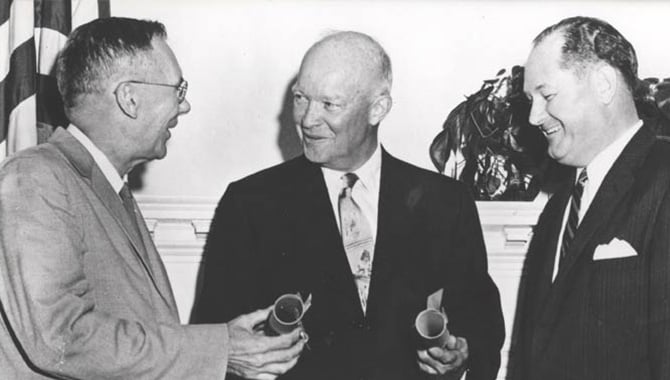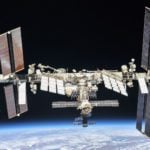U.S. Space Laws, Policies and Regulations
U.S. Space Law
Written by: Space Foundation Editorial Team
U.S. legislation of existing space-related laws are compiled in Title 51 of the United States Code. Some important space laws include:

President Dwight Eisenhower in 1958 commissioning Dr. T. Keith Glennan (right) as the first NASA administrator and Dr. Hugh L. Dryden as deputy administrator. Credit: NASA
Communications Act of 1934
Passed long before the first spaceflight, the Communications Act has been amended over time to govern requirements for commercial satellite operations, licensing, and coordination in the use of the radio spectrum.
National Aeronautics & Space Act of 1958
President Dwight Eisenhower signed the act in 1958, which established NASA as well as U.S. objectives in space: expanding space knowledge; creating and improving space vehicles; studies of benefits from space operation; preserving the United States as a space leader; and sharing discoveries with defense agencies.
The Commercial Space Launch Act
Originally passed in 1984 and since amended, the law grants the U.S. Department of Transportation regulatory oversight of commercial spaceflight, it indemnifies companies for large third-party damages and it informs regulations for commercial human spaceflight.
Land Remote-Sensing Commercialization Act
Passed in 1984, the law principally concerned transferring the U.S. government-owned Landsat
satellite program to private industry, allowing companies to take over operation of the Earth-imaging satellite constellation.
Land Remote-Sensing Policy Act
The 1992 law repealed the Land Remote-Sensing Commercialization Act, as transfer to the private
sector of the U.S. government-owned Landsat proved problematic. The new law gave the Department of Commerce the power to license and regulate a U.S. commercial remote-sensing industry and to outsource the development of new Landsat components to the private sector.
U.S. Commercial Space Launch Competitiveness Act of 2015
The law was designed to encourage commercial spaceflight and innovation by: postponing significant regulatory oversight of private spaceflight companies until 2023; extending the period during which the government indemnifies commercial spaceflight companies for third-party damages beyond the company’s required liability insurance; and granting private companies the right to own resources collected in space, such as materials from asteroid mining.
Weather Research and Forecasting Innovation Act of 2017
The law permits commercial weather satellites and allows NOAA to purchase weather data from commercial weather satellite constellations.
National Aeronautics and Space Administration Transition Authorization Act of 2017
NASA authorization focused on long-term deep space human exploration, investments in science, technology and aeronautics portfolios, and growing the commercial space sector. The law emphasizes maintaining NASA’s continuity of purpose across presidential administrations, and it also includes the TREAT Astronauts Act, which ensures medical treatment for astronauts whose health is affected by space missions.
National Defense Authorization Act of 2020
Establishes the U.S. Space Force within the U.S. Air Force. The act identifies the new military service’s mission set, composition, general duties and chain of command.


